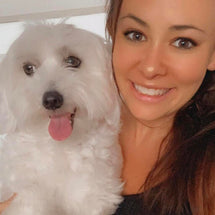How Long Does It Take for Your Dog to Digest Food and Poop?

As a pet parent, you’ve probably noticed that your dog has a unique digestive schedule. One day, they’re as regular as a clock, and the next, they're switching things up! Knowing how long it takes for dogs to digest food and when to expect them to need the ‘bathroom’ can be super helpful.

Understanding Dog Digestion 101
In general, it takes a dog about 6-8 hours to digest a meal, but this can vary based on factors like breed, size, age, and type of food. For example, larger dogs can take longer to digest food than smaller ones, and younger dogs tend to have speedier digestion.
- Puppies and Smaller dogs: Often have faster metabolisms, so they can digest food in around 4-6 hours.
- Larger dogs: Might take closer to 8-12 hours to fully digest a meal.
- Older dogs: Their digestive system tends to slow down, so food can stay in their system a bit longer.
And don't be surprised if your active pup digests food more quickly. When they’re out and about using up all that energy, their digestive system often picks up the pace, too!

The Timeline of a Dog’s Digestive Process
Here’s a rough breakdown of the digestive journey for your doggo:
- Mouth to Esophagus (Seconds): First stop is the mouth, where they gulp down food (let’s be honest, it’s more of a “gulp” than a “chew” for most dogs!). It’s then passed to the esophagus in seconds.
- Stomach (2-4 Hours): Once in the stomach, strong acids work to break down proteins. This process can take 2-4 hours depending on the meal’s content.
- Small Intestine (2-6 Hours): The broken-down food now heads to the small intestine for nutrient absorption. This process lasts around 2-6 hours.
- Large Intestine (Up to 12 Hours): The large intestine absorbs any remaining water and nutrients. The result? You guessed it—poop! This stage can take a few more hours, with waste hanging around in the colon until nature calls.
In total, the process from food bowl to ‘backyard’ can take anywhere from 6 to 12 hours, but sometimes even up to 24 hours depending on the dog and their diet.

What Affects Your Dog’s Digestion?
Dogs are unique, and several factors affect how quickly (or slowly) they process food:
- Type of Food: Organic dry dog food or fresh raw dog food with whole ingredients is easier to digest. However, if a meal is particularly high in fat, it could slow down digestion. Proteins are easier to digest, while fibrous foods take a little longer.
- Dietary fibre: Fibre is great for digestion, but too much can keep things moving a bit too quickly. Fibre-rich foods, like sweet potatoes or peas, help dogs feel fuller longer and promote regular bowel movements.
- Hydration: Dogs that drink plenty of water tend to have smoother digestion and regular poops, as water helps move food through their system.
When to Expect a Bathroom Break
Generally, most dogs will need to poop within 8 to 12 hours of a meal. However, some dogs may only go once daily, while others might go two or three times a day! Every dog has their own schedule, so as long as they’re consistent and comfortable, there’s no need to worry about their “timing.”

Why do Dogs Poo After They Eat?
You may have noticed after every meal your dog heads out to the backyard to do his or her business. But surely the food hasn't made itself right through in a matter of minutes - right?
Correct, it's definitely not the meal your dog just consumed but due to a natural bodily reflex called the gastrocolic reflex.
Gastrocolic Reflex occurs when the stomach stretches and activates this reflex, sending signals to the colon to move things along. Essentially, eating kick-starts the digestive tract into action, preparing room for the new food by pushing waste out.
Tips for a Happy, Healthy Digestion
Want to keep things moving at a good pace? Here are a few tips:
- Regular Meals: Feed your dog at the same times each day. This creates a rhythm, so you’ll both have an idea of when “business” will need to be done.
- Plenty of Water: Encourage your dog to drink water regularly to keep everything flowing smoothly.
- Quality Food: High-quality, digestible food with balanced nutrients is essential for your dog’s digestive health. Look for foods with good protein sources, moderate fat, and a healthy dose of fibre to keep things on track!

When to Check with Your Vet
If you notice any sudden changes in your dog’s bathroom habits, it’s always a good idea to consult with your vet. Diarrhoea, constipation, or going too long without pooping could indicate an issue, so keep an eye out for any signs of discomfort.
In the meantime, enjoy the journey of getting to know your dog’s digestive clock. Just like us, dogs have their own schedules and quirks, so let them lead the way!






